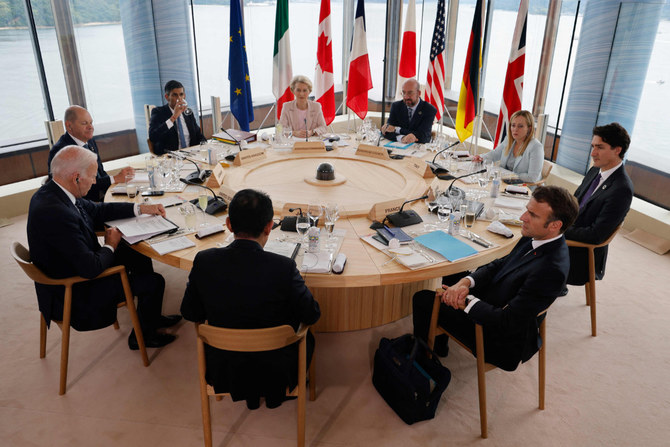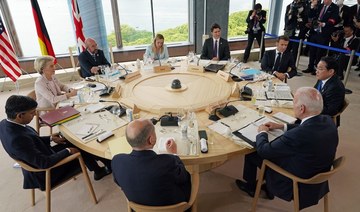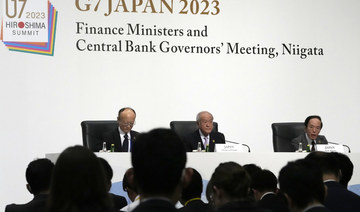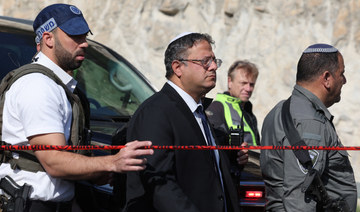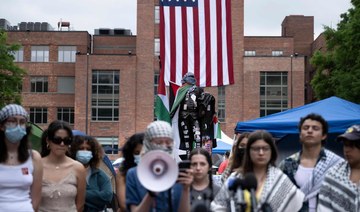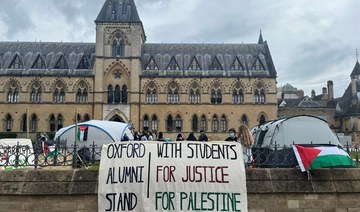HIROSHIMA, Japan: Leaders of the world’s most powerful democracies warned China and North Korea against building up their nuclear arsenals, pivoting to major northeast Asian crises ahead of the arrival later Saturday of Ukrainian President Volodymyr Zelensky.
The focus on Asia at the Group of Seven summit comes as leaders tighten sanctions meant to punish Moscow and change the course of its 15-month invasion of Ukraine. Japan confirmed that Zelensky’s decision to attend the G7 in person stemmed from his “strong wish” to participate in talks that will influence his nation’s defense against Russia.
US National Security Adviser Jake Sullivan said that President Joe Biden and Zelensky would have direct engagement at the summit, a day after Biden announced his support for training Ukrainian pilots on US-made F-16 fighter jets, a precursor to eventually providing those aircraft to Ukraine’s Air Force.
World leaders have faced a high-stakes balancing act in Hiroshima as they look to address a raft of global worries demanding urgent attention, including climate change, AI, poverty and economic instability, nuclear proliferation and, above all, the war in Ukraine.
China, the world’s No. 2 economy, sits at the nexus of many of those concerns.
There is increasing anxiety in Asia that Beijing, which has been steadily building up its nuclear bomb program, could try to seize Taiwan by force, sparking a wider conflict. China claims the self-governing island as its own and regularly sends ships and warplanes near it.
The G7 leaders issued a statement warning that China’s “accelerating build-up of its nuclear arsenal without transparency (or) meaningful dialogue poses a concern to global and regional stability.”
North Korea, which has been testing missiles at a torrid pace in an attempt to perfect a nuclear program meant to target the mainland United States, must completely abandon its nuclear bomb ambitions, the leaders said, “including any further nuclear tests or launches that use ballistic missile technology. North Korea cannot and will never have the status of a nuclear-weapon State under” international nuclear treaties, the statement said.
The green light on F-16 training is the latest shift by the Biden administration as it moves to arm Ukraine with more advanced and lethal weaponry, following earlier decisions to send rocket launcher systems and Abrams tanks. The United States has insisted that it is sending weapons to Ukraine to defend itself and has discouraged attacks by Ukraine into Russian territory.
“We’ve reached a moment where it is time to look down the road again to say what is Ukraine going to need as part of a future force, to be able to deter and defend against Russian aggression as we go forward,” Sullivan said.
An EU official, speaking on condition of anonymity to brief reporters on the deliberations, said Zelensky will take part in two separate sessions Sunday. The first session will be with G7 members only and will focus on the war in Ukraine. The second session will include the G7 as well as the other nations invited to take part in the summit, and will focus on “peace and stability.”
The G7 leaders also used their summit to roll out a new wave of global sanctions on Moscow as well as plans to enhance the effectiveness of existing financial penalties meant to constrain President Vladimir Putin’s war effort.
“Our support for Ukraine will not waver,” the G7 leaders said in a statement released after closed-door meetings. They vowed “to stand together against Russia’s illegal, unjustifiable and unprovoked war of aggression against Ukraine.”
“Russia started this war and can end this war,” they said.
Zelensky has consistently called for the supply of Western fighter jets to bolster his country’s defenses against Russia’s invasion, but has until now faced skepticism from the United States that they would turn the tide in the war.
Now, as Ukraine has improved its air defenses with a host of Western-supplied anti-aircraft systems and prepares to launch a counteroffensive against Russia, officials believe the jets could become useful in the battle and essential to the country’s long-term security.
Biden’s decisions on when, how many, and who will provide the fourth-generation F-16 fighter jets will be made in the months ahead while the training is underway, Biden told leaders.
The F-16 training is to be conducted in Europe and will likely begin in the coming weeks. That’s according to two people who spoke on the condition of anonymity to discuss Biden’s private conversations with allies.
Zelensky said Friday that he had opened a visit to Saudi Arabia, where Arab leaders were holding their own summit.
The latest sanctions aimed at Russia include tighter restrictions on already-sanctioned people and firms involved in the war effort. More than 125 individuals and organizations across 20 countries have been hit with US sanctions. The financial penalties have been primarily focused on sanctions evaders connected to technology procurement for the Kremlin. The Commerce Department also added 71 firms to its own list.
Treasury Secretary Janet Yellen said the Friday sanctions “will further tighten the vise on Putin’s ability to wage his barbaric invasion and will advance our global efforts to cut off Russian attempts to evade sanctions.”
In addition, new reporting requirements were issued for people and firms that have any interest in Russian Central Bank assets. The purpose is to “fully map holdings of Russia’s sovereign assets that will remain immobilized in G7 jurisdictions until Russia pays for the damage it has caused to Ukraine,” the US Treasury Department said.
Russia is now the most-sanctioned country in the world, but there are questions about the effectiveness.
Maria Snegovaya, a senior fellow at the Center for Strategic and International Studies, said going into the summit that while G7 countries “deserve credit” for their sanctions, “Russia still maintains capacity to fight this war in the long term.”
She added that war’s costs are “easily manageable for Russia in the next couple of years at least, and the cumulative effect of sanctions is just not strong enough to radically alter that.”
The G7 nations said in Friday’s statement that they would work to keep Russia from using the international financial system to prosecute its war, and they urged other nations to stop providing Russia with support and weapons “or face severe costs.”
World leaders Friday visited a peace park dedicated to the tens of thousands who died in the world’s first wartime atomic bomb detonation. Japanese Prime Minister Fumio Kishida, who represents Hiroshima in parliament, wants nuclear disarmament to be a major focus of discussions.
The peace park contains reminders of Aug. 6, 1945, when a US B-29 dropped an atomic bomb over Hiroshima, a city that has become synonymous with anti-nuclear peace efforts.
Biden, who scrapped plans to travel on to Papua New Guinea and Australia after his stay in Japan so that he can get back to debt limit talks in Washington, arranged to meet Saturday on the G-7 sidelines with leaders of the so-called Quad partnership, made up of Japan, Australia, India and the US
As G7 attendees made their way to Hiroshima, Moscow unleashed yet another aerial attack on the Ukrainian capital. Loud explosions thundered through Kyiv during the early hours, marking the ninth time this month that Russian air raids have targeted the city after weeks of relative quiet.
In a bit of dueling diplomacy, Chinese President Xi Jinping is hosting the leaders of the Central Asian countries of Kazakhstan, Kyrgyzstan, Tajikistan, Turkmenistan and Uzbekistan for a two-day summit in the Chinese city of Xi’an.
The G7 leaders are also to discuss efforts to strengthen the global economy and address rising prices that are squeezing families and government budgets around the world, particularly in developing countries in Africa, Asia and Latin America.
A US official said the leaders on Saturday would issue a joint communique outlining new projects in the G7’s global infrastructure development initiative, which is meant to offer countries an alternative to China’s investment dollars.
The G7 includes Japan, the United States, the United Kingdom, France, Germany, Canada and Italy, as well as the European Union.




